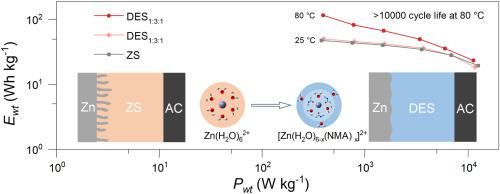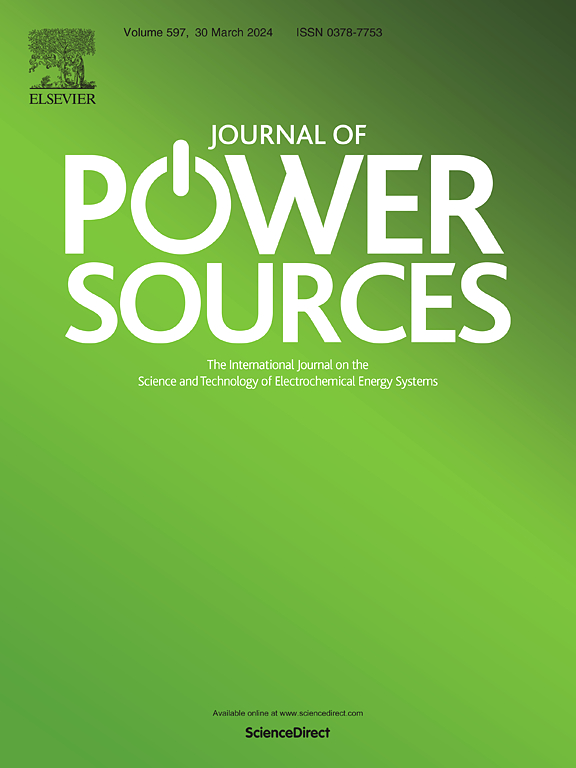Ternary zinc-based deep eutectic solvents for durable zinc-ion capacitors capable of withstanding extreme high temperatures
IF 7.9
2区 工程技术
Q1 CHEMISTRY, PHYSICAL
引用次数: 0
Abstract
The employment of aqueous zinc salt solutions as electrolytes confers cost and safety advantages to aqueous zinc-ion capacitors (ZICs). However, the high chemical H2O with low boiling point in typical aqueous zinc sulfate (ZS) electrolyte greatly restricts the performance of ZICs in high-temperature conditions. Herein, a ternary deep eutectic solvent (DES) electrolyte capable of withstanding extreme high temperatures of up to 80 °C is synthesized for the first time by utilizing inter-component hydrogen bonding. The DES with optimized component ratios allows long-term stable cycling of Zn||Zn cells for >1200 h with nearly 100 % Coulombic efficiency. When used as the high-temperature electrolyte, ZICs at 80 °C yield a much higher specific capacitance of up to 247 F g−1 than at room temperature, while those with ZS as the electrolyte hardly work properly under this condition. The hydrogen bonding system reconfigured by ligand competition in DESs effectively inhibits Zn dendrite formation and the activity of H2O, thus endowing ZICs up to 10000 cycles at 80 °C. This ternary DES not only opens the way for the design of high-temperature electrolytes for ZICs, but also offers new possibilities for the development of other energy storage devices that need to be adapted to extreme operating environments.

用于耐极端高温的耐用锌离子电容器的三元锌基深共晶溶剂
采用锌盐水溶液作为电解液,使锌离子电容器具有成本和安全性方面的优势。然而,典型的硫酸锌(ZS)水溶液中含有高沸点的化学水,极大地限制了ZICs在高温条件下的性能。本文首次利用组分间氢键合成了能够承受高达80℃极端高温的三元深共晶溶剂(DES)电解质。具有优化组分比的DES可使Zn||锌电池长期稳定循环1200h,库仑效率接近100%。作为高温电解液,ZICs在80℃下的比电容高达247 F g−1,远远高于室温下的比电容,而以ZS作为电解液的比电容在此条件下很难正常工作。在DESs中,通过配体竞争重新配置的氢键体系有效地抑制了Zn枝晶的形成和H2O的活性,从而使ZICs在80°C下可循环10000次。这种三元DES不仅为ZICs的高温电解质设计开辟了道路,而且为需要适应极端操作环境的其他储能设备的开发提供了新的可能性。
本文章由计算机程序翻译,如有差异,请以英文原文为准。
求助全文
约1分钟内获得全文
求助全文
来源期刊

Journal of Power Sources
工程技术-电化学
CiteScore
16.40
自引率
6.50%
发文量
1249
审稿时长
36 days
期刊介绍:
The Journal of Power Sources is a publication catering to researchers and technologists interested in various aspects of the science, technology, and applications of electrochemical power sources. It covers original research and reviews on primary and secondary batteries, fuel cells, supercapacitors, and photo-electrochemical cells.
Topics considered include the research, development and applications of nanomaterials and novel componentry for these devices. Examples of applications of these electrochemical power sources include:
• Portable electronics
• Electric and Hybrid Electric Vehicles
• Uninterruptible Power Supply (UPS) systems
• Storage of renewable energy
• Satellites and deep space probes
• Boats and ships, drones and aircrafts
• Wearable energy storage systems
 求助内容:
求助内容: 应助结果提醒方式:
应助结果提醒方式:


